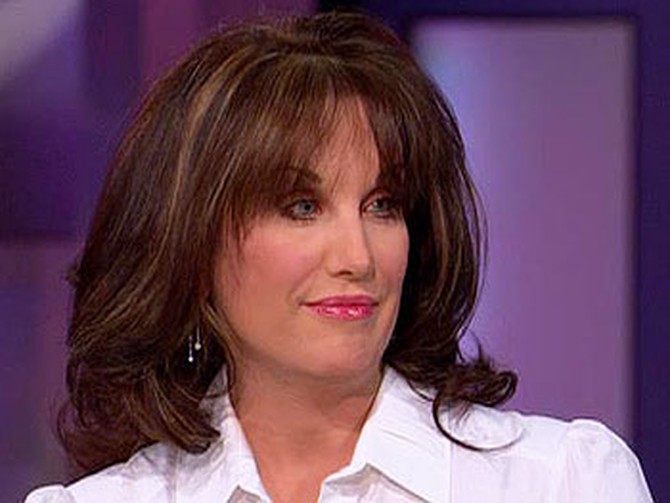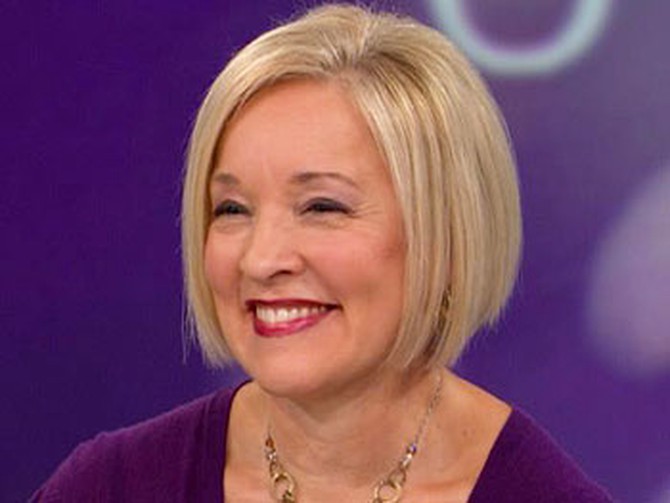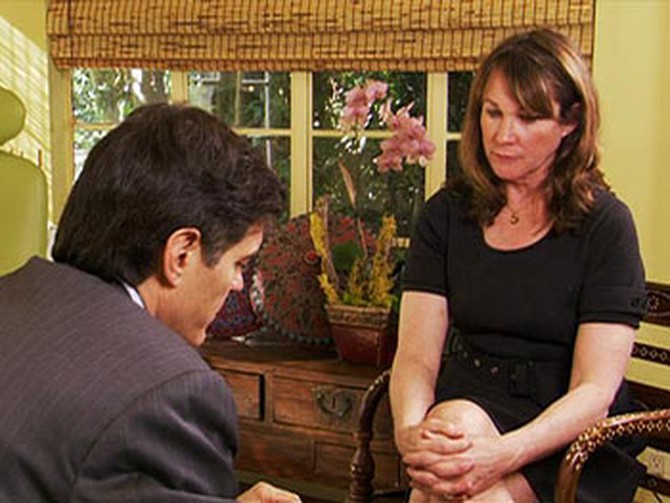Is Hormone Replacement Therapy Right for You?

Legions of women across America are going about their daily lives feeling out of sorts. "You feel flat and you feel tired, you haven't had a good night's sleep in two years [and you're] just going through the motions, trying to get through the day," Oprah says. "You feel like your life force is being sucked out of you."
The February issue of O, The Oprah Magazine delves into the root of this problem and possible fixes, and Oprah is taking the discussion even farther. "We're opening a national conversation about hormone replacement therapy," she says. "This is about your hormones being out of whack, and you don't even know—we haven't had a language to talk about it yet."
Hormone replacement therapy is relevant to women of all ages, Oprah says. "If you're a woman who's planning to live past the age of 35, at some point you're going to face hormone imbalance," she says. "All women need to be armed with this information."
The February issue of O, The Oprah Magazine delves into the root of this problem and possible fixes, and Oprah is taking the discussion even farther. "We're opening a national conversation about hormone replacement therapy," she says. "This is about your hormones being out of whack, and you don't even know—we haven't had a language to talk about it yet."
Hormone replacement therapy is relevant to women of all ages, Oprah says. "If you're a woman who's planning to live past the age of 35, at some point you're going to face hormone imbalance," she says. "All women need to be armed with this information."

Robin McGraw says she is familiar with feelings of fatigue and lifelessness. "It didn't come because of menopause," she says. "It actually started long before I was in the menopause phase of my life."
When Robin was 44, she started getting hot flashes and feeling unlike herself. "I'd had a hot flash, and I thought, 'What's going on? I'm too young for this,'" she says. So she started interviewing doctors and vowed to find a way to get her hormones back in balance.
When Robin was 44, she started getting hot flashes and feeling unlike herself. "I'd had a hot flash, and I thought, 'What's going on? I'm too young for this,'" she says. So she started interviewing doctors and vowed to find a way to get her hormones back in balance.

Robin writes about her experiences with hormone replacement therapy in her book What's Age Got to Do with It? Like many mothers, Robin says she was making her family a priority but not taking care of herself. "[As women, we] put ourselves at the bottom of the list," she says. "It was through my mother's untimely death and raising my boys that I started to think, 'Wait a minute, I love my children, so I need to take care of their mother.'"
Robin says it wasn't just physical symptoms like hot flashes that alerted her to a problem. She noticed differences in her overall attitude. "I thought, 'Why can't I pull myself out of this? Because I'm a happy person. I'm always smiling, and I'm losing that. I'm losing that excitement for everything I'm taking on in my life right now.'"
When Robin went to the doctor, she was told she was in menopause and got a prescription for hormones. Though Robin insisted she wanted to do research before taking anything, she says the doctor laughed at her. "She said, 'Oh you'll be back. Trust me,'" Robin says. "I think the one moment that sealed my fate ... was when she said, 'And also fill this because you're going to need it.' And it was antidepressants."
Robin says it wasn't just physical symptoms like hot flashes that alerted her to a problem. She noticed differences in her overall attitude. "I thought, 'Why can't I pull myself out of this? Because I'm a happy person. I'm always smiling, and I'm losing that. I'm losing that excitement for everything I'm taking on in my life right now.'"
When Robin went to the doctor, she was told she was in menopause and got a prescription for hormones. Though Robin insisted she wanted to do research before taking anything, she says the doctor laughed at her. "She said, 'Oh you'll be back. Trust me,'" Robin says. "I think the one moment that sealed my fate ... was when she said, 'And also fill this because you're going to need it.' And it was antidepressants."

Instead of blindly following her doctor's advice, Robin decided to take control of her body. "Healthcare management is not one size fits all," she says. "It's one size for you and you and you."
Dr. Christiane Northrup, author of The Wisdom of Menopause, says there are two types of hormone replacement therapy that Robin could have chosen: bioidentical and synthetic. Dr. Northrup says there is some confusion as to how bioidentical hormones are created. "Bioidentical means it matches exactly the molecular structure of the hormone that your own body produces—it's a hormone from Mother Nature. So if you get the raw material from soybeans and yams, which they do, and then you convert it into something that matches your own body's hormone exactly, that is a bioidentical hormone," she says.
Dr. Northrup says synthetic hormones, the more conventional approach for treatment, differ from bioidenticals in their structure. "[Synthetic hormones are] made from horse urine and are natural for a horse. But they're synthetic for a human body. They are often added to a synthetic progestin, which doesn't match anything like your body's natural progesterone. It has completely different effects...Many women do well on these."
After doing extensive research, Robin decided that, for her, the best route was bioidentical hormone replacement therapy.
Get answers about both types of hormone therapy.
Watch Dr. Northrup explain the basics of menopause, perimenopause and why someone might want to take hormones.
Dr. Christiane Northrup, author of The Wisdom of Menopause, says there are two types of hormone replacement therapy that Robin could have chosen: bioidentical and synthetic. Dr. Northrup says there is some confusion as to how bioidentical hormones are created. "Bioidentical means it matches exactly the molecular structure of the hormone that your own body produces—it's a hormone from Mother Nature. So if you get the raw material from soybeans and yams, which they do, and then you convert it into something that matches your own body's hormone exactly, that is a bioidentical hormone," she says.
Dr. Northrup says synthetic hormones, the more conventional approach for treatment, differ from bioidenticals in their structure. "[Synthetic hormones are] made from horse urine and are natural for a horse. But they're synthetic for a human body. They are often added to a synthetic progestin, which doesn't match anything like your body's natural progesterone. It has completely different effects...Many women do well on these."
After doing extensive research, Robin decided that, for her, the best route was bioidentical hormone replacement therapy.
Get answers about both types of hormone therapy.
Watch Dr. Northrup explain the basics of menopause, perimenopause and why someone might want to take hormones.

Many women find the specifics of hormone replacement therapy confusing, and Dr. Northrup says it's no surprise. "The mainstream medical community has flip-flopped on hormone replacement over the last five decades," she says. "It's good for you; it's bad for you. It's no wonder women are confused."
A lot of it is controversial because previous studies have linked some kinds of hormone replacement therapy with cancer, heart attacks and strokes.
Watch Dr. Northrup explain the history of hormone therapy.
A lot of it is controversial because previous studies have linked some kinds of hormone replacement therapy with cancer, heart attacks and strokes.
Watch Dr. Northrup explain the history of hormone therapy.

Dr. Wulf Utian, executive director of the North American Menopausal Society, says he has concerns with some of the issues surrounding bioidenticals.
"This is a multibillion-dollar industry," says Dr. Utian, who also is a gynecologist at the world-renowned Cleveland Clinic. "There's no such thing as a natural hormone. They're all made in the lab one way or another."
Dr. Utian cautions women to be wary of any manufacturer making claims of safety that can't be proven. "When a company, whether on its website or in its marketing materials, makes claims of safety that they cannot prove, they are misleading women," he says. "I think that's criminal."
Dr. Northrup agrees that taking any hormones comes with risk and says that no woman should undergo hormone replacement therapy without the supervision and care of a doctor. "You want to be working with a team," she says.
"This is a multibillion-dollar industry," says Dr. Utian, who also is a gynecologist at the world-renowned Cleveland Clinic. "There's no such thing as a natural hormone. They're all made in the lab one way or another."
Dr. Utian cautions women to be wary of any manufacturer making claims of safety that can't be proven. "When a company, whether on its website or in its marketing materials, makes claims of safety that they cannot prove, they are misleading women," he says. "I think that's criminal."
Dr. Northrup agrees that taking any hormones comes with risk and says that no woman should undergo hormone replacement therapy without the supervision and care of a doctor. "You want to be working with a team," she says.

Dr. Oz is fascinated by the buzz surrounding hormone replacement therapy, so he headed to Los Angeles to accompany 52-year-old Linda to a visit with Robin's own gynecologist, Dr. Prudence Hall. Linda says her menopause symptoms were making her miserable.
"It's mainly the hot flashes," Linda says. "And the sleepless nights. I'm irritable as well. I just want to be my old self again."
After Dr. Hall conducts a series of tests, she determines that Linda has a hormonal imbalance and prescribes hormones to help alleviate Linda's symptoms. Dr. Hall tells Dr. Oz that women should begin to feel better in as soon as a few days after starting the treatment.
A week later, Linda says she couldn't be happier. "I feel wonderful," she says. "I was having hot flashes every 45 minutes to an hour. The other day, I was out with a girlfriend and all day I didn't have one hot flash. I couldn't believe it."
Watch Dr. Oz's visit to Dr. Hall's office.
"It's mainly the hot flashes," Linda says. "And the sleepless nights. I'm irritable as well. I just want to be my old self again."
After Dr. Hall conducts a series of tests, she determines that Linda has a hormonal imbalance and prescribes hormones to help alleviate Linda's symptoms. Dr. Hall tells Dr. Oz that women should begin to feel better in as soon as a few days after starting the treatment.
A week later, Linda says she couldn't be happier. "I feel wonderful," she says. "I was having hot flashes every 45 minutes to an hour. The other day, I was out with a girlfriend and all day I didn't have one hot flash. I couldn't believe it."
Watch Dr. Oz's visit to Dr. Hall's office.

Michele is Skyping in to the Oprah Show studio from Burlington, Ontario, Canada. She says she thinks she's lost her mind as a result of her menopausal symptoms, which include migraines, moodiness and exhaustion.
"In two and a half years, I have not had a full night's sleep. I haven't had one day of feeling well. I constantly feel sick," Michele says. "Plus, I have a bad attitude because I'm mad. I'm really, really angry."
Michele is encouraged by Linda's results and would love to visit Dr. Hall's practice for herself. Determined to help Michele get back to her old self, Robin offers to take Michele for her first visit. "Thank you," Michele says. "This isn't just for me—it's for my family, too, because they're missing the old me."
"We want you to feel great," Oprah says. "I can't wait to see you feel better!"
"In two and a half years, I have not had a full night's sleep. I haven't had one day of feeling well. I constantly feel sick," Michele says. "Plus, I have a bad attitude because I'm mad. I'm really, really angry."
Michele is encouraged by Linda's results and would love to visit Dr. Hall's practice for herself. Determined to help Michele get back to her old self, Robin offers to take Michele for her first visit. "Thank you," Michele says. "This isn't just for me—it's for my family, too, because they're missing the old me."
"We want you to feel great," Oprah says. "I can't wait to see you feel better!"

Oprah says she will continue to talk about hormone replacement in the upcoming weeks, and she urges women to talk to their doctors and take responsibility for their own health.
"Talk to him or her about what you've learned today. Get the books; get the information," she says. "The information is out there for you...You have to do the research."
Start researching today—get all the info you need on hormone replacement therapy.
Plus, pick up a copy of the February issue of O magazine and tune in on January 29 when Suzanne Somers and Oprah explore this issue even further.
The conversation is just getting started! Share your story and ask questions on the message board.
"Talk to him or her about what you've learned today. Get the books; get the information," she says. "The information is out there for you...You have to do the research."
Start researching today—get all the info you need on hormone replacement therapy.
Plus, pick up a copy of the February issue of O magazine and tune in on January 29 when Suzanne Somers and Oprah explore this issue even further.
The conversation is just getting started! Share your story and ask questions on the message board.
Published 01/15/2009

